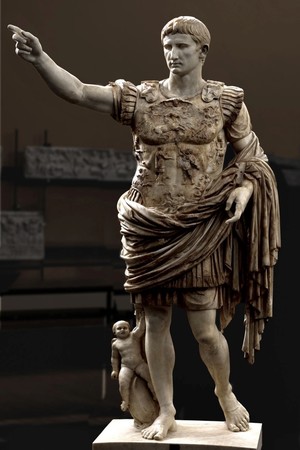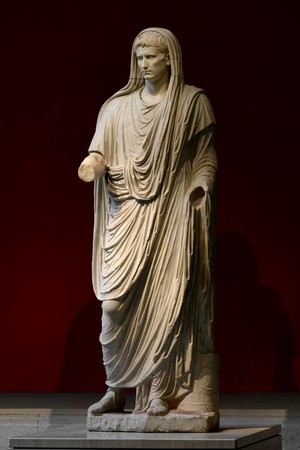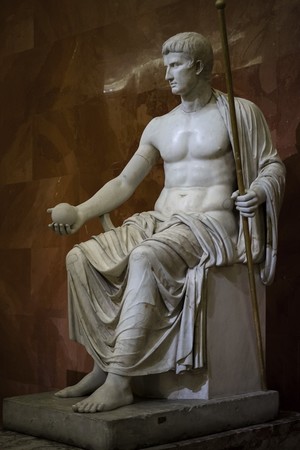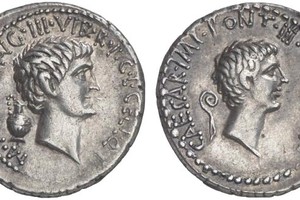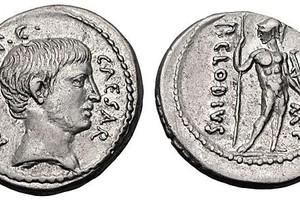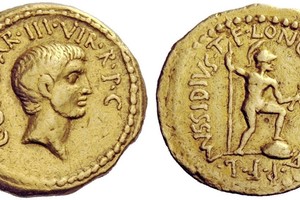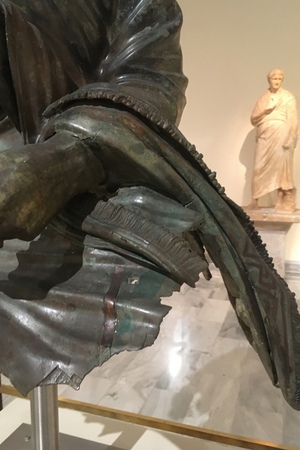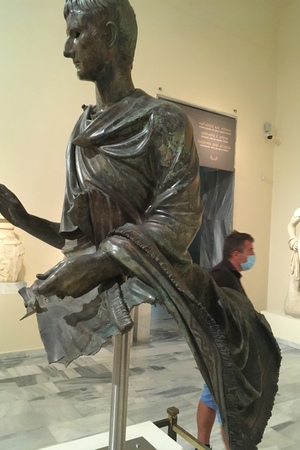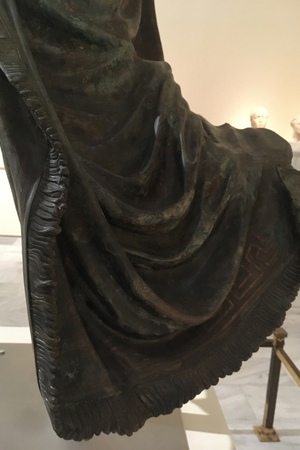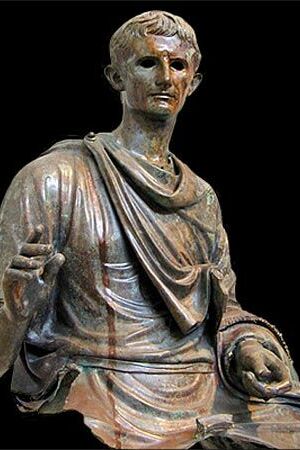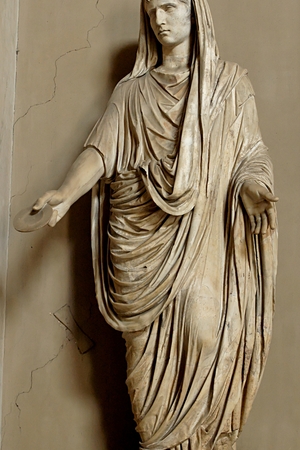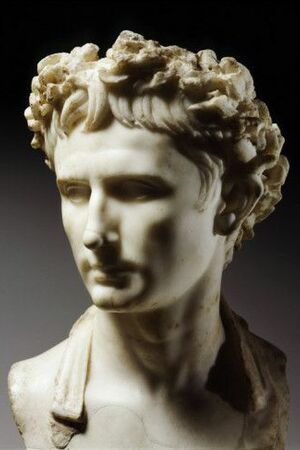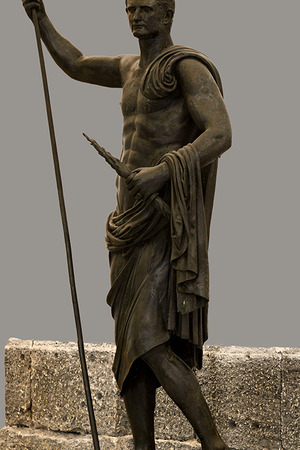Octavian Augustus
Gaius Julius Caesar Octavianus Augustus (Latin: Octavianus Augustus), originally named Gaius Octavius Thurinus, (Gaius Octavius Thurinus) was an ancient Roman political figure and the founder of the Roman Empire.
Dates of life: 63 BCE – 14 CE. He was born on September 23rd.
Dates of his reign: 27 BCE – 14 CE. Although Octavian defeated all his enemies in 30 BCE, it took him three more years to establish order in the country and in Rome.
As a result, many scholars consider the start of his reign from his victory in 30 BCE, while others consider it from the establishment of order in the state and in Rome, which occurred in 27 BCE.
Nickname: Augustus (the revered one); "Father of the Fatherland" (Latin: Pater Patriae).
Origin and Early Life
Octavian's ancestors were from the city of Velitrae (now Vellettri, Italy), near Rome, and were engaged in banking operations. His father, Gaius Octavius, was from a wealthy plebeian family belonging to the equestrian order. He was the first in his family to achieve the rank of senator. Octavian's mother, Atia (Atia Balba Caesonia), came from the Julii family and was a niece, on her mother's side, of Gaius Julius Caesar, whose heir Octavian would later become. Octavian had a younger sister named Octavia Minor (she would later become the wife of Mark Antony, with whom Octavian would later have a falling-out due to Cleopatra).
There is debate among historians about Octavian's exact date and place of birth. Since ancient times, it has not been clear when and where Octavian was born. There is disagreement regarding his birthplace, with some arguing that it was either Rome itself or the city of Velitrae. As for his birthdate, there is debate between September (either the 23rd or 24th) 63 BCE or mid-December 63 BCE. The German scholar Johannes Kepler even believed that Octavian was born on July 2nd, 63 BCE. Octavian's father, like many non-noble Romans, did not have a cognomen (the third part of a name), but Gaius did. His cognomen, "Thurinus" (Latin: Thurinus – "Thurian"), was given to him at birth in honor of his father's victory over the rebellious slaves led by Spartacus near the city of Thurii. Octavian himself associated his cognomen with one of the epithets of the god Apollo, meaning "doorkeeper" (Ancient Greek: "θυραῖος (thuraios)" – "behind the door").
Father of Octavian, from the end of 61 to 59 BCE, served as the governor of the province of Macedonia, but it is unknown whether his wife and children were with him at that time. In 59 BCE, on his way back to Rome, Octavian's father suddenly died, never having achieved the consulship. His mother soon remarried in 57 or 56 BCE to Lucius Marcius Philippus, who was consul in 56 BCE. Young Octavian, who likely spent his early years in Velitrae, was entrusted to the care of his maternal grandmother, Julia, sister of Caesar, who died in 51 BCE. At her funeral, Octavian delivered a funeral speech. It is most likely that Octavian first encountered his famous uncle at the beginning of the Civil War.
Although his mother and grandmother were able to provide Octavian with a good education by the standards of the capital, Octavian himself, due to health problems, was unable to serve in the military. Consequently, he devoted himself diligently to his education. It was during this time that he befriended many of his peers who would later assist him in governing the empire, such as Marcus Agrippa.
Octavian's initiation into adulthood (48 BCE) coincided with the start of the civil war between Caesar and Pompey (49-45 BCE). In 47 BCE, with Caesar's assistance, Octavian became a member of the college of pontiffs, replacing the deceased Lucius Domitius Ahenobarbus, and was appointed city prefect. In 46 BCE, although he did not personally participate in Caesar's African campaign, he took part in Caesar's triumph for that campaign and received a reward from Caesar himself. From that point onward, Octavian increasingly appeared in public alongside Caesar. He desired to participate in Caesar's second Spanish campaign but arrived too late for its decisive battle, the Battle of Munda (March 45 BCE). In 45 BCE, through the law of Tribune Lucius Cassius, who was acting on Caesar's behalf, a portion of wealthy plebeian families was transferred to the patrician class to increase its membership. Among the plebeian families elevated to patrician status was Octavian's family. In September 45 BCE, Caesar drafted his will, in which he designated Octavian as his principal heir, on the condition that Octavian agreed to undergo the process of adoption. However, until Caesar's assassination in March 44 BCE, Roman society remained unaware of the contents of his will and the name of his primary heir.
Among historians, disputes persist as to whether Octavian himself knew the content of Caesar's will and whether he was the ultimate inheritor or merely a temporary figure. During the winter of 45-44 BCE, Octavian was in Apollonia (the city of Fier, Albania), completing his education and preparing to actively participate in Caesar's new military campaign, which never took place due to Caesar's assassination.
Struggle for Caesar's Inheritance (Conflict with Caesar's Assassins and the Second Triumvirate, Battle with Mark Antony)
Octavian learned of Caesar's death in Apollonia, and from there he journeyed to Rome, where by that time the entire city and all of Italy knew who had become Caesar's primary heir. By May 44 BCE, Octavian arrived in Rome, where he began to consolidate his authority and seek the right to inherit Caesar's legacy. With the support of Caesar's veterans, Octavian declared himself the lawful heir of Caesar according to his will and adopted the name "Gaius Julius Caesar Octavianus," completing the adoption process. Due to Antony's refusal to release funds from Caesar's treasury, Octavian sold part of his own property and distributed 300 sesterces to each Roman, as promised by Caesar. He organized games in honor of Caesar's victories. All of these actions contributed to the growth of his influence, while Mark Antony, through his own actions, only diminished his authority and eventually, by the autumn of 44 BCE, quarreled with a faction of senators, prompting his departure from Rome. Octavian also left for southern Italy to gather troops. He managed to recruit an army of 10,000 soldiers and occupy Rome, but he could not convince the people and the Senate to go to war against Mark Antony. As a result, he withdrew from Rome to Arretium (modern-day Arezzo). Antony reentered Rome in November 44 BCE, restored order, and then departed for Cisalpine Gaul, besieging Brutus' stronghold, the city of Mutina (modern-day Modena).
Ultimately, with the support of Cicero, who had his personal grievances against Antony, the Senate declared war on Antony and dispatched troops to Mutina. With Cicero's assistance, Octavian was granted the powers of a praetor, prematurely became a senator (normally, a seat in the Senate was guaranteed after serving as a quaestor), and could be elected to all positions ten years earlier than the prescribed term. Consequently, Octavian, along with his army and the two consuls, Gaius Vibius Pansa and Aulus Hirtius, marched towards Mutina. In April 43 BCE, in a series of battles near Mutina, which ended in a stalemate as Antony and the consuls each won one battle, both consuls perished, and Antony fled to Transalpine Gaul. The Senate ordered Gaius to transfer command of the army to Decimus Brutus, but Gaius refused and proposed that until new consuls were elected, he and Cicero should be appointed as suffect consuls. However, the Senate denied his claim and did not allow him to celebrate a triumph for Mutina. In the end, Octavian discovered that there was a conspiracy against him and Mark Antony within the Senate. Supporters of the republic aimed to eliminate the candidates vying for control of Rome by exploiting their mutual enmity.
Upon discovering this, Octavian and Antony immediately made peace. They formed the so-called Second Triumvirate in October 43 BCE, including military commander Mark Antony. Afterward, they entered Rome with their armies in November of the same year, where they conducted proscriptions, similar to what Sulla had done before. During the proscriptions, many high-ranking Roman aristocrats and senators, including Cicero, were killed. Octavian and Antony then restored order and left a portion of their forces, along with Lepidus, in Italy. They proceeded to defeat the conspirators and assassins of Caesar, Gaius Cassius Longinus and Marcus Junius Brutus, who had established themselves with their own armies in Macedonia near the town of Philippi. Two battles known as the Battles of Philippi took place there in October 42 BCE, just a few days apart. The triumvirs emerged victorious and carried out a new division of power, excluding Lepidus from their ranks. According to the agreement, Octavian departed for the West, including Rome itself, while Mark Antony headed east. Antony prepared for a war against Parthia in the east, while Octavian, upon returning to Rome, distributed land to soldiers, including former soldiers of Brutus and Cassius, in order to prevent them from rebelling since there were still supporters of the republic who were willing to exploit these forces. With little remaining available land in Italy, Octavian began confiscating land from cities that opposed the triumvirs. All of these actions caused discontent among the Italians, aggravated by the food shortage resulting from the grain supply from Egypt. The supply was disrupted due to a naval blockade by Sextus Pompeius, the elder son of Pompey the Great, who had established himself in Sicily.
Lucius Antony, the younger brother of Mark Antony, and Mark Antony's wife, Fulvia, took advantage of the situation. They accused Octavian of instigating the uprising among the Italians and the naval blockade of Italy, promising that Mark Antony would restore the republic upon his return from the East. Their propaganda found success not only among the Italians but also among some senators. As a result, the so-called Perusine War (autumn 41 BCE - spring 40 BCE) broke out. In the summer of 41 BCE, Lucius, along with his loyal forces, occupied Rome and headed north, hoping to join forces with the regular troops of Asinius Pollio and Ventidius Bassus. However, Octavian managed to prevent the union of the two conspirator armies and block Lucius Antony in Perusia (modern-day Perugia). After a long siege, the city was taken by storm. Octavian pardoned Lucius and several other conspirators (including Fulvia, Ventidius Bassus, and Asinius Pollio), but he allowed his troops to plunder the city of Perusia, while executing some of the local elites who had supported Lucius.
Several surviving participants of the uprising fled to Mark Antony in the East. Despite his affair with Cleopatra and his preparations for war against Parthia, Mark Antony crossed over to Italy and besieged the important port of Brundisium (modern-day Brindisi). Sextus Pompeius also joined Antony. The situation was heading towards a new war between the triumvirs, but their soldiers forced them to reconcile and extend the terms of the Second Triumvirate agreement. Antony obtained control over all the eastern provinces, Octavian over all the western provinces, and Lepidus was left with only the province of Africa. All the triumvirs had the right to recruit new soldiers in Italy. The agreement was sealed with a marriage between the widowed Antony and Octavia, Octavian's sister, who had recently lost her husband. The interests of Sextus Pompeius were disregarded by the triumvirs, and he resumed the blockade since he controlled Sicily, Corsica, and Sardinia. After resolving their differences with Octavian, Antony departed for the east to prepare for war against Parthia. Octavian and Lepidus took decisive action against the naval blockade imposed by Sextus Pompeius. The war against Sextus Pompeius (the rebellion of Sextus Pompeius) lasted from 43 to 36 BCE. Ultimately, the triumvirs managed to gain time through a negotiated truce. Octavian even married Scribonia, a relative of Sextus Pompeius, but the war reignited. Due to the betrayal of one of his supporters, Sextus lost Sardinia and Corsica. A series of naval battles ensued, in which Sextus emerged victorious, and Octavian's fleet suffered significant losses, including a severe storm at sea.
During the conflict with Sextus, Octavian and Mark Antony met in the city of Tarentum in the spring of 37 BCE. Octavian requested several ships from Antony to aid in the battle against Sextus. During their meeting, they extended their term as triumvirs for another five years. Antony was also supposed to lend 120 warships to Octavian for his fight against Sextus, and in return, he would receive 20,000 legionnaires for his war against Parthia. Antony fulfilled the conditions of the agreement, but Octavian only provided one-tenth of the agreed-upon number of soldiers necessary for Antony's war against Parthia. Immediately after the extension of their triumvirate powers, Octavian began building a new fleet. Eventually, Octavian and Lepidus landed their troops in Sicily. By September 36 BCE, Sextus was defeated both at sea and on land, and he fled to the east. Lepidus, without waiting for Octavian's arrival, made peace with the Pompeian forces. With a large army in Sicily, Lepidus sought to strengthen his position within the triumvirate and declared the island as his territory. Using his vast financial resources, Octavian managed to sway Lepidus's army to his side, and Lepidus's forces abandoned him. Octavian pardoned Lepidus for his betrayal but removed him from the political arena. Afterward, power over Rome and the republic remained in the hands of Octavian and Mark Antony.
Despite the formal existence of the alliance, both sides were preparing for war. In the West, Octavian successfully handled his affairs, while in the East, Mark Antony's situation deteriorated. He lost the war against Parthia and divorced Octavia, marrying the queen of Egypt, Cleopatra. Eventually, the decisive war took place between Octavian and Mark Antony (summer 32 BCE - 30 BCE). Antony and Cleopatra, alongside Octavian, gathered their forces and fleets. Mark Agrippa, Octavian's general, led the military operations on behalf of Octavian in this war. Augustus's legions easily defeated Antony's army, and some time later, in the decisive Battle of Actium (31 BCE), Agrippa's fleet also achieved victory. As a result of this military campaign, all of Mark Antony's territories came under Octavian's control. Octavian spent the next two years consolidating his power in the East before returning to Rome. There, he organized a three-day celebratory triumph for Illyria, the victory at Actium, and Rome's conquest of Egypt.
Establishment of the Empire and the Reign of Octavian Augustus
The regime of Octavian Augustus as the Roman Empire acquired the historical name "Principate". The Principate refers to the form of government in the early Roman Empire from the 1st century BCE to the 3rd century CE (27 BCE - 284 CE). During this period, the ruler's power combined elements of monarchy and republic. The head of state was called the princeps, meaning "first among equals," emphasizing the democratic nature of his authority. He was also considered a tribune of the people, thus encompassing multiple functions and powers.
Internal policy:
The foundations of the Principate were laid during the reforms of 27-23 BCE. Under Octavian, the Senate ceased to be a consultative body and acquired legislative powers. However, the magistrates retained the right of legislative initiative. The Senate also gained judicial powers. Nevertheless, real power was concentrated in the hands of Octavian, who pursued a cautious policy toward the Senate. The emperor implemented several reforms that regulated various aspects of the Senate's activities. Octavian paid significant attention to reducing the oversized Senate's numbers. Initially, Augustus planned to reduce the Senate from 1,000 members to 300, as it was before Sulla's time. However, due to active resistance from senators, he reduced their number only to 600. Octavian placed himself first on the senatorial list, thereby becoming the princeps senatus. As a result of Octavian's reforms, the Senate's influence over foreign policy, provincial administration, and finances diminished. He also conducted military reform, establishing the organization of the Roman army as a professional force.
Many legions were disbanded, approximately 60% of them, leaving only about 25 legions. This significantly reduced the tax burden and replenished the treasury of the empire. Emperor Octavian established a term of military service of 20 years. The legions became more permanent, and their combat effectiveness increased. In addition to the standing army, a permanent naval fleet was created.
Administrative reform divided the provinces into senatorial and imperial ones. During his reign, Octavian visited almost all provinces of the empire. He initiated the minting of gold coins, as previously the minting was irregular. Rome had faced problems with the shortage of coins, but after conquering Spain and Egypt, Rome gained access to mines, and Octavian Augustus established regular coin minting. Coin minting from silver and gold was under the personal supervision of the emperor. In addition to the state treasury, an imperial treasury was established, which was filled with revenues from imperial provinces and used for military expenses, soldier payments, and veterans' benefits. Tax collection became regular, reducing the likelihood of a crisis. Coins became widely used in all spheres of life. After the conquest of Egypt, Rome established trade with India, and maritime trade flourished. Octavian established his personal guard, the Praetorian Guard, learning from the unfortunate fate of Caesar.
Octavian was engaged in the improvement of Rome, including the establishment of a night watch, road construction, the expansion of the Tiber riverbed, and the construction of temples. He organized the distribution of bread and gladiatorial games. Octavian attached great importance to restoring public morality based on ancient Roman models. He regulated the order of marriage, marital life, and other aspects. In 12 BCE, after the death of Lepidus, Octavian became the Pontifex Maximus and actively participated in religious ceremonies. He restored several festivals and religious collegia and renovated or built many new temples in honor of Roman gods. In 8 BCE, the month of Sextilis was renamed August in his honor. On February 5, 2 BCE, Octavian received the honorary title "Father of the Fatherland" from the Senate.
During the reign of Augustus, the cult of the emperor began to form, expressed through prayers of the people to the emperor as a god, the placement of statues of the emperor in all temples in Rome and the empire, and the depiction of his image on coins and other items. One of the manifestations of the cult of the emperor was the renaming of the month Sextilis to Augustus. During his reign, Jesus Christ was born in Judea. He ruled during the transition from BC to AD, our era. He patronized poets, contributing to the "Golden Age" of Roman poetry.
The reign of Octavian Augustus is considered the golden age for Rome. He is called a skilled politician who managed to expand the borders of Rome and strengthen the country from within. The restoration of order in Rome's internal affairs and the implementation of a series of reforms helped revive the economy, industry, and life in the Roman Republic turned Empire, leading to an active foreign policy. Octavian's foreign policy was mostly successfu
Foreign policy:
Parallel to the conquest of Germany, further expansion of Roman presence in the Balkans was taking place. The Illyrian War was concluded, adding territories on the right bank of the Danube River (the future Roman province of Pannonia) to Rome. Several rebellions in the provinces of Africa and Nova Africa were suppressed because they posed a threat. By 6 AD, the Romans consolidated their position in the new province of Germania. However, in 9 AD, the populations of this province, along with neighboring Germanic tribes, rebelled and managed to destroy three Roman legions and the provincial governor Quinctilius Varus in the Battle of the Teutoburg Forest. As a result, Roman forces retreated beyond the Rhine River, which became the border between Rome and the Germanic tribes of Germany. According to ancient authors, Emperor Octavian Augustus was so devastated and saddened by the defeat of his troops in Germany that he did not shave or cut his hair for several months, often repeating "Quinctilius Varus, give me back my legions!" (Suet. Aug. 23, Suetonius, The Divine Augustus, 23).
In the eastern part of Thrace, it was incorporated into the Roman province of Moesia. Despite successes and failures in the West, Rome sought to act more through diplomacy and trade rather than military force in the East. The expansion of borders in the East was mainly peaceful. In 25 BC, after the death of the last king of Galatia, the kingdom became a new Roman province. In 6 AD, the Kingdom of Judea was incorporated into the province of Syria, with autonomy, and was governed by a prefect (procurator) from the equestrian class, like Egypt. In many small states in Asia Minor, Octavian left power in the hands of the previous rulers, even if they had previously supported Antony. From the time of Augustus, Rome also began to exert significant influence in the politics of the Bosporan Kingdom.
The main opponent of Rome in the East was the Parthian Empire, which was equally powerful to the Roman Empire. Through diplomacy and a series of minor military clashes, Octavian was able to conclude a long-lasting peace with them and bring Armenia into the sphere of Roman influence. In 20 BC, envoys from India arrived to meet the emperor, presumably hoping to organize an alliance against Parthia. Octavian even made a treaty with the envoys, laying the foundation for Roman-Indian relations and trade. The Parthians even returned standards and captives from the unsuccessful campaign of Crassus (56 BC). One of the reliefs on Augustus' breastplate in Prima Porta depicts the Parthians returning the captured Roman standards to the Romans. A significant achievement of Augustus' policy in the East was establishing direct connections between Rome and China (then ruled by the Han Dynasty).
Emperor Octavian passed away in 14 AD. After his death, he was deified according to the cult of the emperor that developed during his reign.
Family, children and heirs
Оctavian was engaged to Servilia, the daughter of Publius Servilius Vatia Isauricus, who served as consul twice in the 40s BC. However, he soon broke off the engagement and married Clodia Pulchra (a relative of Mark Antony) in 43 BC for political advantage. In 41 BC, he divorced Clodia and married Scribonia (a relative of Sextus Pompey), but this marriage also ended soon, partly due to his relationship with Livia, the wife of Tiberius Claudius Nero. Livia divorced Tiberius Claudius Nero and married Augustus, who adopted her children from her previous marriage, Tiberius and Drusus (rumored to be Augustus' own child).
From his marriage to Scribonia, Augustus had a daughter named Julia the Elder, who was later exiled to the island of Pandateria (now one of the islands in the Tyrrhenian Sea off the coast of Italy) in 2 BC due to her scandalous behavior. Besides his daughter, Augustus had no other children, especially sons who could inherit power. This ultimately led to succession problems after his reign. At different times, Augustus designated various relatives as his potential successors. However, in the end, his adopted son and stepson of Livia, Tiberius, became his heir and successor as the emperor of the Roman Empire.
The image of Octavian in culture
Since Octavian became the first emperor of Rome, many statues and portraits of him on coins have survived to this day. This was made possible because Octavian promoted the cult of the emperor in Rome and throughout the empire. However, Octavian demanded that he be depicted as young, even in old age, making it very difficult to establish statues and portraits on coins that accurately depict his appearance in old age. Even the history of Russia in the 16th century was connected with the name of Octavian Augustus. In the "Tales of the Princes of Vladimir" (a literary monument of the 16th century), the royal origin of the Russian tsar Ivan the Terrible was justified by his kinship with Rurik (the first prince in Rus) and the first Roman emperor, Octavian Augustus, through his brother Prus, whose existence is not confirmed.
In the 17th-19th centuries, the image of Augustus was interpreted differently in different countries. Some admired him (for example, in England), while others initially despised him for his reign but started revering him with the rise of Napoleon (France). In the late 19th and early 20th centuries, the main attention was focused on the nature of Augustus' power. The term "Principate," which characterized all of Augustus' policies, was established in literature by T. Mommsen. However, there was debate in academic circles about the essence of the Principate. In the historiography of the first half of the 20th century, particular emphasis was placed on Augustus' policies toward the army as the pillar of his power, which led to comparisons with European absolute monarchies and later totalitarian regimes.
In the 20s and 30s of the 20th century, Augustus and his biography were popular in Italy, and Benito Mussolini often referred to him in his speeches. He financed excavations in Rome and throughout Italy, reconstructed and restored part of the buildings from the time of Augustus in Rome, and partially restored the Altar of Augustan Peace. In addition to all of this, numerous books and literary works have been written about Augustus, including Alan Massie's novel "Augustus" (1986), J. Edward Williams' novel "Augustus" (1973), William Shakespeare's play "Antony and Cleopatra" (16th century), and others.
Often in historical films and TV series dedicated to the history of Ancient Rome, actors portraying Octavian Augustus can be seen. Here are some films that mention Augustus or discuss him and his reign: the films "Antony and Cleopatra" (1908, 1912), the film "Cleopatra" (1963), the miniseries "I, Claudius" (1976), a series of mini-films about the Roman Empire, with the first film in the series being "Roman Empire: Augustus" (2003), the TV series "Rome" (2005), and others. The first emperor of Rome is also a character in several video games, including Civilization IV and its expansion Civilization IV: Warlords, Civilization V, and Total War: Rome II - Emperor Augustus.
Related topics
Roman Republic, Second Triumvirate, Roman Emperors, Roman Republic, Roman Empire, Gaius Julius Caesar
Literature
Ancient authors:
1) The Acts of the Divine Augustus. Translated by I. Sh. Shifman, I. Sh. Caesar August, L., 1990, pp. 189-199.
2) Appian. Civil wars.
3) Plutarch. Comparative biographies. Mark Antony.
4) Dion Cassius. Roman history.
5) Nicholas of Damascus. About the life of Caesar Augustus and his upbringing.
6) Suetonius. "The Life of the Twelve Caesars". August.
7) Tacitus. Annals. Often there is a reference to Octavian, although the work itself begins with his death.
Contemporary authors:
1) Mashkin N. A. The Principle of August — Moscow; L.: Publishing House of the USSR Academy of Sciences, 1949.
2) Cambridge Ancient History. - 2nd ed — - Volume X: The Augustan Empire, 43 BC-AD 69 — - Cambridge: Cambridge University Press, 1996 In 2 volumes.
3) Nerodo J.-P. August, Moscow: Molodaya gvardiya Publ., 2003, p. 92.
4) Parfenov V. N. The beginning of Octavian's military and political career // The ancient world and archeology. - Issue 4. Saratov, 1979.
5) Shifman I. Sh. Caesar August — - L.: Nauka, 1990.
6) Goldsworthy A. Augustus. First Emperor of Rome. — New Haven; London: Yale University Press, 2014.
7) Scullard H. H. From the Gracchi to Nero: A History of Rome 133 BC to AD 68. — 5th ed. — London; New York: Routledge, 2011.
8) Gruen E. Augustus and the Making of the Principate // The Cambridge Companion to the Age of Augustus / Ed. by K. Galinsky. — Cambridge: Cambridge University Press, 2007
9) Shotter D. Augustus Caesar. 2nd ed. — London; New York: Routledge, 2005
10) Grant M. Roman Emperors — Moscow: Terra-Knizhny Club, 1998.
11) Parfenov V. N. Imperator Tsezar August: Army. War. Politics. St. Petersburg: Aleteya Publ., 2001.
12. Egorov A. B. Rome on the edge of epochs. Problemy rozhdeniya i formirovaniya principata [Problems of birth and formation of the principal], LSU Publishing House, 1985.
13) Zanker P. The Power of Images in the Age of Augustus. — Ann Arbor: University of Michigan Press, 1989.
14. Egorov A. B. Rimskoe gosudarstvo i pravo [Roman State and Law]. Epoch of Empire: a textbook. St. Petersburg: SPbU Publ., 2013.
15) Parfenov V. N. Rome from Caesar to August. Essays on socio-political history. - Saratov: Publishing House of the Saratov University, 1987

 Gallery
Gallery






